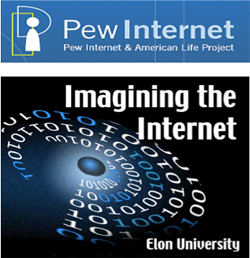 The Pew Internet and American Life Project is one of the great research treasures of America, constantly producing provocative surveys describing our evolving relationship with technology.
The Pew Internet and American Life Project is one of the great research treasures of America, constantly producing provocative surveys describing our evolving relationship with technology.
In partnership with Elon University's, they've released a report on Imagining the Internet, under this headline:
Teens-to-20s to benefit and suffer due to 'always-on' lives. From their amazing ability to juggle many tasks to their thirst for instant gratification, survey reveals experts' hopes and fears
The survey has an interesting methodology: they interviewed over 1,000 experts in the field of technology, education, and social media, asking them to reflect upon their hopes and fears for the future of young people. The report is a kind of word association test, with respondents asked to briefly reflect on topics like multi-tasking, human evolution, the digital divide, education and so forth. A number of my Berkman colleagues, like danah boyd and David Weinberger are featured.
The collection of responses contains hope for a new generation of cyborg-super humans and despair at the miserable generation taking our their white earbuds and preparing to enter the workplace (and many of them are probably leaving their ear buds in). The report makes for easy skimming, with hundreds of comments from scholars and experts on all kinds of topics. Overall, the comments probably say less about the future than they do about the philosophical orientation of the experts.
The takehome message- the Internet continue to be good and bad. It reminds me of a point made by my undergraduate advisor, the historian Edmund Russell. He observed that Shakespeare's collect plays were organized into three categories: the tragedies, where events led towards disaster; the comedies, where conflicts led to joyful resolutions; and then finally the histories, where things got better in some ways for some people and got worse for others. I've always been inclined to the latter perspective, and the Pew report is good fodder for it.